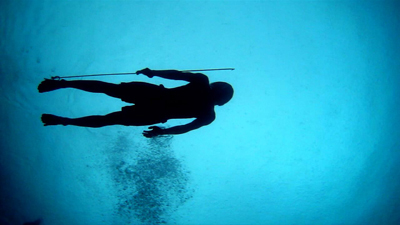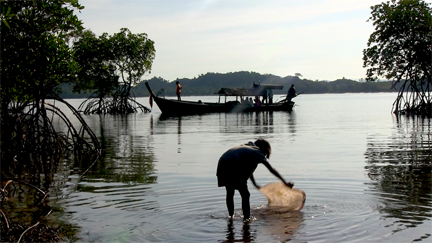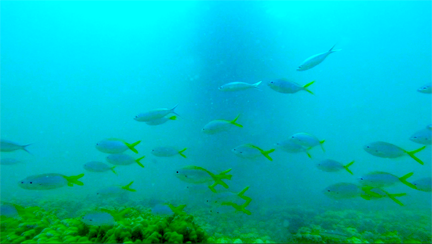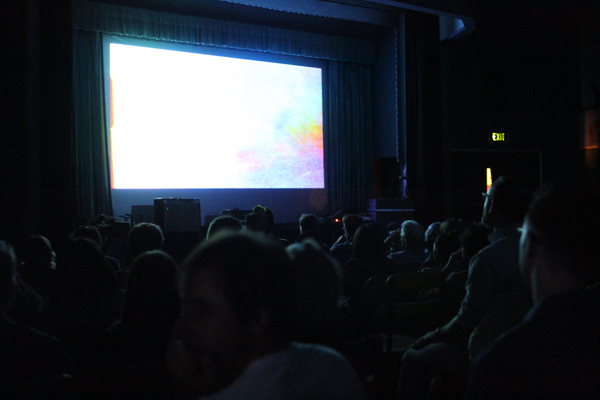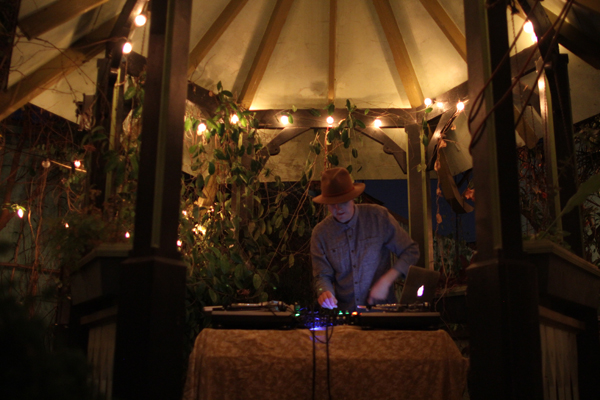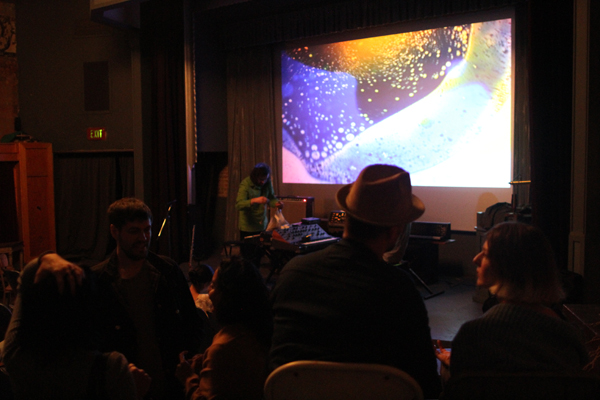- Past Events
- "Ruins" & "Magnavoz" - a 16mm screening with Jesse Lerner
- "Tertium non datur" Megan Koester Live Comedy
- "The Cognomi Theory of the Antarctic Interior" at The Velaslavasay Panorama
- (Kid)temporary Art Auction
- (Kid)temporary Art Exhibit
- 10th Annual Bob Baker Day Festival
- 11th Annual Bob Baker Day
- 11th Ever Los Angeles Old Time Social
- 12th Ever LA Old Time Social
- 13th Ever LA Old Time Social
- 14th E
- 15th Ever LA Old Time Social
- 18th Annual Dia De Los Muertos Festival
- 2012 Microfest
- 236 Years of Panoramic Technology
- 3 Stories High
- A Border Peepshow
- A Concert in Support of Frank Fairfield's Forthcoming European Tour
- A Journey to the Beginning of Time - Cesta do pravěku (1955)
- A N
- A Spirited Evening of Louise Glaum
- A Spitzbergen Panorama
- A World Redrawn: Eisenstein and Brecht in Hollywood
- AE & Nanuka Tchitchoua: Moving Images and Song
- AHOJ SPRING!
- AUTOMATA presents: A program of live film/performance works by Jordan Biren & Perry Hoberman
- Adrenaline, Eyesight and Uncertainty
- After Dark: Extended Cinemas at the Exploratorium
- Afternoon Tea with The Long Lost
- Ahoj Spring! At Bob Baker Day 2022
- All That Passes Before You, Already in Ruins & Denial Clinic
- Am I Not Here?: Valentine's Day Edition
- Ampersand Salon
- An Evening Burlesque Performance with Miss Tosh
- An Evening Of Microcinema
- An Evening With The Shenyang Visual Archive
- An Evening With Æ at The Velaslavasay Panorama
- An Evening of Ethereal Instruments with The Douglas Lee
- An Evening of Magic
- An Evening of Neon
- An Evening with Daniel Bachman and Meg Baird
- An Evening with Sara Velas at The City Reliquary
- Ana Caravelle and Friends
- Analog Open House Day at Velasalvasay Panorama
- Anatomical Venuses, The Slashed Beauty, and Fetuses Dancing a Jig
- Announcing the close of the Effulgence of The North
- Arctic Spectacles: The Frozen North in Visual Culture 1818-1875
- Art Deco Society of Los Angeles Tour & Lecture
- Balboa Park Border Trolley Tours
- Banana Moonshine Special
- Be Kind to Animals
- Before Nanook: The frozen zone in silent film
- Benthic Show with Ana Caravelle
- Blessing of the Animals
- Blessing of the Animals at Olvera Street
- Bloomsday
- Bloomsday Open House
- Bob Baker Day 2018!
- Bob Baker Day 2019
- Bob Baker Day 2021
- Bob Baker Day 2023
- Bride of Wildenstein The Musical
- Buñuel's "Simon of the Desert" & Selections from Jesse Lerner's Archive in 16mm
- COLD WORM (time, auto-corrected)
- Carson and Harbor Communities Environmental Health Fair
- Charles Cushman's Photographic Journey Through a Vanishing America
- Chinese Lunar New Year Reception with "Shengjing Panorama"
- Chris Schlarb's Twilight and Ghost Stories
- Coffee Talk: Sara Velas at the EBell of Los Angeles
- Common Field Convening - at JACCC
- Concrete Daisies
- Cristo Del Arbol de la Calle 22
- Daniel Bachman
- Das Grenzkästchen
- Davinci's Film Festival of Hollywood
- Davinci's Films of Hollywood
- Department of Curiosities Lingerie Salon & Meet Miss Tosh
- Dia De Los Muertos
- Dia De Los Muertos 2022
- Dia de los Muretos Festival on 24th Street
- Dialogues With Owen Land - February 28
- Dog, Lights and Sewing Machine
- Dog, Lights, and Sewing Machine
- Duckbits Presents: Are We Not Human?
- Día de los Muertos Street Festival
- EXPERIMENTAL QUADRUPLE THREAT: Celluloid and sound all around...
- El Ajolote De Fuego
- Electric Shadows on Penglai Mountain: For Fun
- Electric Shadows on Penglai Mountain: Scenes of City Life 《都市風光》
- Electric Shadows on Penglai Mountain: Spring In A Small Town
- Enchantment of the Glass Armonica
- Exploring Panoramas with Sara Velas
- February Open House
- Film-In-Residence: "Unrequited Love"
- Film-In-Residence: Animations & Shorts by Max Fleischer Studios
- Film-In-Residence: Illusion Travels by Streetcar
- Film-In-Residence: Lola
- Film-In-Residence: Recorder - The Marion Stokes Project
- Film-In-Residence: The Beaver Trilogy
- Film-In-Residence: The Gold Diggers (1983)
- Film-In-Residence: The Gold Rush
- Film-In-Residence: Tivoli
- Film-In-Residence: Who Wants To Kill Jesse?
- Filmic: An Evening of Live Cinema
- Florence in Ruin—or—The Great Escape
- Forest Lawn Museum: Hall of Crucifixion-Resurrection Audio/Visual Debut
- Forever Yours, Nancy
- Fourth Annual Los Angeles Old Time Social
- From 45 to 33; Lewis Klahr's Films About Childhood
- From Dole to the Pole
- From JBAD, Lessons Learned
- Garden Tea with Professor Zhao Gan Li
- Garden Tea with Urhu & Guzheng An afternoon of Chinese String Music
- Glendora Historical Society Visit
- Gra
- Grand Views: The Immersive World of Panoramas
- Grifthorse Pop-Up
- Harmony Lane (1954) - In 3-D
- Hayden's Ferry Review, Superstition Review & Yemassee Journal
- Henry Hills: Rhythmic States
- Holiday Hours of the Velaslavasay Panorama
- How To Be An Albatross, An Afternoon with Charles Hood
- I Am Big Bird -The Caroll Spinney Story
- INTERTIDAL
- Illusion Travels By Streetcar - La Ilusion Viaja en Tranvia
- Illustrated Lecture: Shengjing Panorama
- Immersive Research Sessions: No. 1
- Immersive Research Sessions: No. 2
- In China - 1989 to Now: Immersive 360-degree Panoramas
- In Egypt & North Africa - 1971 To 1997: Traditions of Music & Dance
- In Search of The Lost Panorama
- Ishi's Brain
- Julianna Barwick
- Kathy Rose: Performances and Rituals
- Kosmos: Russian space flights of the imagination from Tsiolkovsky to Klushantsev
- LOS OLVIDADOS - The "Happy Ending"?
- Landscape is a Weapon
- Le Carnaval des Spectres
- Les Sewing Sisters Record Read-lease Party
- Les Soviets Plus l’Électricité
- Los Angelenos at Yayasan Bali Purnati
- Los Angeles Filmforum: The Cinema Cabaret
- Los Angeles Internationa Neon Jubilee - Evening Jubilee
- Los Angeles International Neon Jubilee
- Los Angeles Nomadic Divisions presents:
- Los Angeles Public Library NeiSci Tuesday
- Love Songs From The Gulag
- Luis Buñuel
- Luminous Revelations
- Lun*na Menoh performing Maurice Ravel's Bolero
- March Open House
- Maréorama Resurrected
- Max Wong and the Bees!
- Melodic Bells of Near and Far
- Memoria Technica
- Microfest 2014
- More Events Forthcoming...
- Museum Open Hours
- Mush! To The Movies! Vol. I
- Mush! To The Movies! Vol. II
- Mush! To The Movies! Vol. III
- Mush! To The Movies! Vol. IV
- Mush! To The Movies! Vol. V
- Mush! To The Movies! Vol. VI
- OPUNTIA
- Offending the Audience
- On Holographic Perspective
- OneHouse ArtExperience Field Trip
- OneHouse Arts Garden Workshop
- Opening Weekend
- Panorama of Horrors Spook Show
- Panoramas And Living Memory
- Pasadena's Arroyo Seco and the Antiquarian Camera
- Picture Shows from the 52nd Ann Arbor Festival
- Play Street
- Professor Russell Potter's Evening of Arctic Novelty
- Pursuing the Verdant Dream
- Pursuing the Verdant Dream
- Red Hen Press / Los Angeles Review Poetry Event
- Reveries & Reveries: Going Deeper
- Rob's Test Upcoming Event
- Robot Monster (1953) - In Restored 3D!
- Roofless Painters Summer 2019 Book Painting Exhibition
- Rose Lowder: Colorful Frames
- Sara Velas presents Shengjing Panorama at Krannert Art Museum
- Saturday Afternoons at the Exploratorium
- Secret History of the Dividing Line, A True Account in Nine Parts: Parts I-IV
- See Glacial Breach - 4 Days Only!
- Shengjing Panorama Limited Express
- Sixth Annual Bob Baker Day Carnival
- Slovak & Czech Heritage Gathering
- Soil Desire People Dance
- Song of Seikilos
- Southland Institute
- Space Administration
- SunFest 2018
- Sunset Chronicles V
- Superdevoiche Bulgarian Polyphony Conducted by Tzvetanka Varimezova
- Systema Naturae
- TWO DREAM FILMS BY RICHARD MYERS - Richard Myers in person
- Talking Picture Blues (Voices Rising)
- Territorium Tijuana
- Test Event 0201
- The 10th Ever Los Angeles Old Time Social
- The
- The 5th Ever Los Angeles Old Time Social
- The 6th Ever Los Angeles Old Time Social
- The 7th Ever Los Angeles Old Time Social
- The 8th Ever Los Angeles Old Time Social Concert
- The 9th Ever Los Angeles Old Time Social
- The Art of Illusions - Pre-cinematic Entertainment in Mexico
- The Cotabato Sessions
- The Dream Machine
- The Future Is A Well-Traveled Track: Wheary Peepers Trunk Show
- The Future is a Well-Traveled Track
- The Grand Moving Mirror of California
- The Kirlian Witness
- The Last Arctic Show
- The Last Passenger
- The Last Servants Broadcast
- The Last Servants on 88.8 FM
- The Love Tapes
- The Magician's Eye
- The Million Pet Soirée
- The Minnow Show!
- The Minnow Show! Episode 2 - SMOKEHOUSE SHORTS IN 16MM
- The Minnow Show! Episode 3 - Masks & Animation
- The Murder of Hi Good
- The Nova Tuskhut Trading Post Sale
- The Painted Cinema of Karel Zeman
- The Panorama-kan of Meiji Japan
- The Pierced Heart & The Machete and Staring Into the Sun
- The Reader's Chorus
- The Shenyang Visual Archive Game Show Night
- The Sparkly Christmas Winter Holiday Hanukkah Nogstyle Christmas Show! (Recession Edition)
- The Stepford Wives (1975)
- The Stolen Airship - Ukradená vzducholod (1966)
- The V.P.E.S. Supper Club Fundraising Dinner
- Third Ever Los Angeles Old-Time Social
- This Fair June Day, the 16th, 1904 - Bloom's Day
- Travis Wilkerson performs "Do You Know Who Fired the Gun?"
- Tropicália
- Twilight Man
- Union Square Florist Shop - Better Living Through Floristry
- Union Square Florist Shop
- Union Square Florist Shop
- V.P.E.S. Supper Club Culinary Excursion and Preview Performance
- VP at Los Angeles Archives Bazaar at USC
- VPES Event: "The Very Last Night is The First"
- VPES Special Event: Midcentury Stereopanorama
- VPES: Panoramic Piano Garden Party
- VPLABC!
- Vexing History: A Queer LA Love Story
- Video Consortium
- Visit Shenyang Station
- Welcome to the Circus
- Welcoming Shengjing Panorama to The VP
- What if Esquimaux Had No Words For Blue? An Illustrated Lecture by Professor Zed Adams
- Wild Things / Wild Scenes
- XYZ #1
- XYZ #2
- XYZ #3
- XYZ #4: EC◦LEC◦TICS
- XYZ #5 Hosted by LUN*NA MENOH
- XYZ #6
- XYZ #7
- XYZ #8 - Summer of 2014
- XYZ #9
- Yodels in the Gardens
- Zedashe Ensemble ~ Folk Music and Dance From Caucasus Georgia
- Zoe Beloff
- do not spare by daniel lang/levitsky
- earth dwell/er's school - garden session
- wasteLAnd Music presents: Marco Fusi on violin
- ~Dia de los Muertos Street Festival~
- ¡Circo Escalofriante!
- Past Correspondence
- Private Rentals
- Home
- On View
- Events
- Past Events
- "Ruins" & "Magnavoz" - a 16mm screening with Jesse Lerner
- "Tertium non datur" Megan Koester Live Comedy
- "The Cognomi Theory of the Antarctic Interior" at The Velaslavasay Panorama
- (Kid)temporary Art Auction
- (Kid)temporary Art Exhibit
- 10th Annual Bob Baker Day Festival
- 11th Annual Bob Baker Day
- 11th Ever Los Angeles Old Time Social
- 12th Ever LA Old Time Social
- 13th Ever LA Old Time Social
- 14th E
- 15th Ever LA Old Time Social
- 18th Annual Dia De Los Muertos Festival
- 2012 Microfest
- 236 Years of Panoramic Technology
- 3 Stories High
- A Border Peepshow
- A Concert in Support of Frank Fairfield's Forthcoming European Tour
- A Journey to the Beginning of Time - Cesta do pravěku (1955)
- A N
- A Spirited Evening of Louise Glaum
- A Spitzbergen Panorama
- A World Redrawn: Eisenstein and Brecht in Hollywood
- AE & Nanuka Tchitchoua: Moving Images and Song
- AHOJ SPRING!
- AUTOMATA presents: A program of live film/performance works by Jordan Biren & Perry Hoberman
- Adrenaline, Eyesight and Uncertainty
- After Dark: Extended Cinemas at the Exploratorium
- Afternoon Tea with The Long Lost
- Ahoj Spring! At Bob Baker Day 2022
- All That Passes Before You, Already in Ruins & Denial Clinic
- Am I Not Here?: Valentine's Day Edition
- Ampersand Salon
- An Evening Burlesque Performance with Miss Tosh
- An Evening Of Microcinema
- An Evening With The Shenyang Visual Archive
- An Evening With Æ at The Velaslavasay Panorama
- An Evening of Ethereal Instruments with The Douglas Lee
- An Evening of Magic
- An Evening of Neon
- An Evening with Daniel Bachman and Meg Baird
- An Evening with Sara Velas at The City Reliquary
- Ana Caravelle and Friends
- Analog Open House Day at Velasalvasay Panorama
- Anatomical Venuses, The Slashed Beauty, and Fetuses Dancing a Jig
- Announcing the close of the Effulgence of The North
- Arctic Spectacles: The Frozen North in Visual Culture 1818-1875
- Art Deco Society of Los Angeles Tour & Lecture
- Balboa Park Border Trolley Tours
- Banana Moonshine Special
- Be Kind to Animals
- Before Nanook: The frozen zone in silent film
- Benthic Show with Ana Caravelle
- Blessing of the Animals
- Blessing of the Animals at Olvera Street
- Bloomsday
- Bloomsday Open House
- Bob Baker Day 2018!
- Bob Baker Day 2019
- Bob Baker Day 2021
- Bob Baker Day 2023
- Bride of Wildenstein The Musical
- Buñuel's "Simon of the Desert" & Selections from Jesse Lerner's Archive in 16mm
- COLD WORM (time, auto-corrected)
- Carson and Harbor Communities Environmental Health Fair
- Charles Cushman's Photographic Journey Through a Vanishing America
- Chinese Lunar New Year Reception with "Shengjing Panorama"
- Chris Schlarb's Twilight and Ghost Stories
- Coffee Talk: Sara Velas at the EBell of Los Angeles
- Common Field Convening - at JACCC
- Concrete Daisies
- Cristo Del Arbol de la Calle 22
- Daniel Bachman
- Das Grenzkästchen
- Davinci's Film Festival of Hollywood
- Davinci's Films of Hollywood
- Department of Curiosities Lingerie Salon & Meet Miss Tosh
- Dia De Los Muertos
- Dia De Los Muertos 2022
- Dia de los Muretos Festival on 24th Street
- Dialogues With Owen Land - February 28
- Dog, Lights and Sewing Machine
- Dog, Lights, and Sewing Machine
- Duckbits Presents: Are We Not Human?
- Día de los Muertos Street Festival
- EXPERIMENTAL QUADRUPLE THREAT: Celluloid and sound all around...
- El Ajolote De Fuego
- Electric Shadows on Penglai Mountain: For Fun
- Electric Shadows on Penglai Mountain: Scenes of City Life 《都市風光》
- Electric Shadows on Penglai Mountain: Spring In A Small Town
- Enchantment of the Glass Armonica
- Exploring Panoramas with Sara Velas
- February Open House
- Film-In-Residence: "Unrequited Love"
- Film-In-Residence: Animations & Shorts by Max Fleischer Studios
- Film-In-Residence: Illusion Travels by Streetcar
- Film-In-Residence: Lola
- Film-In-Residence: Recorder - The Marion Stokes Project
- Film-In-Residence: The Beaver Trilogy
- Film-In-Residence: The Gold Diggers (1983)
- Film-In-Residence: The Gold Rush
- Film-In-Residence: Tivoli
- Film-In-Residence: Who Wants To Kill Jesse?
- Filmic: An Evening of Live Cinema
- Florence in Ruin—or—The Great Escape
- Forest Lawn Museum: Hall of Crucifixion-Resurrection Audio/Visual Debut
- Forever Yours, Nancy
- Fourth Annual Los Angeles Old Time Social
- From 45 to 33; Lewis Klahr's Films About Childhood
- From Dole to the Pole
- From JBAD, Lessons Learned
- Garden Tea with Professor Zhao Gan Li
- Garden Tea with Urhu & Guzheng An afternoon of Chinese String Music
- Glendora Historical Society Visit
- Gra
- Grand Views: The Immersive World of Panoramas
- Grifthorse Pop-Up
- Harmony Lane (1954) - In 3-D
- Hayden's Ferry Review, Superstition Review & Yemassee Journal
- Henry Hills: Rhythmic States
- Holiday Hours of the Velaslavasay Panorama
- How To Be An Albatross, An Afternoon with Charles Hood
- I Am Big Bird -The Caroll Spinney Story
- INTERTIDAL
- Illusion Travels By Streetcar - La Ilusion Viaja en Tranvia
- Illustrated Lecture: Shengjing Panorama
- Immersive Research Sessions: No. 1
- Immersive Research Sessions: No. 2
- In China - 1989 to Now: Immersive 360-degree Panoramas
- In Egypt & North Africa - 1971 To 1997: Traditions of Music & Dance
- In Search of The Lost Panorama
- Ishi's Brain
- Julianna Barwick
- Kathy Rose: Performances and Rituals
- Kosmos: Russian space flights of the imagination from Tsiolkovsky to Klushantsev
- LOS OLVIDADOS - The "Happy Ending"?
- Landscape is a Weapon
- Le Carnaval des Spectres
- Les Sewing Sisters Record Read-lease Party
- Les Soviets Plus l’Électricité
- Los Angelenos at Yayasan Bali Purnati
- Los Angeles Filmforum: The Cinema Cabaret
- Los Angeles Internationa Neon Jubilee - Evening Jubilee
- Los Angeles International Neon Jubilee
- Los Angeles Nomadic Divisions presents:
- Los Angeles Public Library NeiSci Tuesday
- Love Songs From The Gulag
- Luis Buñuel
- Luminous Revelations
- Lun*na Menoh performing Maurice Ravel's Bolero
- March Open House
- Maréorama Resurrected
- Max Wong and the Bees!
- Melodic Bells of Near and Far
- Memoria Technica
- Microfest 2014
- More Events Forthcoming...
- Museum Open Hours
- Mush! To The Movies! Vol. I
- Mush! To The Movies! Vol. II
- Mush! To The Movies! Vol. III
- Mush! To The Movies! Vol. IV
- Mush! To The Movies! Vol. V
- Mush! To The Movies! Vol. VI
- OPUNTIA
- Offending the Audience
- On Holographic Perspective
- OneHouse ArtExperience Field Trip
- OneHouse Arts Garden Workshop
- Opening Weekend
- Panorama of Horrors Spook Show
- Panoramas And Living Memory
- Pasadena's Arroyo Seco and the Antiquarian Camera
- Picture Shows from the 52nd Ann Arbor Festival
- Play Street
- Professor Russell Potter's Evening of Arctic Novelty
- Pursuing the Verdant Dream
- Pursuing the Verdant Dream
- Red Hen Press / Los Angeles Review Poetry Event
- Reveries & Reveries: Going Deeper
- Rob's Test Upcoming Event
- Robot Monster (1953) - In Restored 3D!
- Roofless Painters Summer 2019 Book Painting Exhibition
- Rose Lowder: Colorful Frames
- Sara Velas presents Shengjing Panorama at Krannert Art Museum
- Saturday Afternoons at the Exploratorium
- Secret History of the Dividing Line, A True Account in Nine Parts: Parts I-IV
- See Glacial Breach - 4 Days Only!
- Shengjing Panorama Limited Express
- Sixth Annual Bob Baker Day Carnival
- Slovak & Czech Heritage Gathering
- Soil Desire People Dance
- Song of Seikilos
- Southland Institute
- Space Administration
- SunFest 2018
- Sunset Chronicles V
- Superdevoiche Bulgarian Polyphony Conducted by Tzvetanka Varimezova
- Systema Naturae
- TWO DREAM FILMS BY RICHARD MYERS - Richard Myers in person
- Talking Picture Blues (Voices Rising)
- Territorium Tijuana
- Test Event 0201
- The 10th Ever Los Angeles Old Time Social
- The
- The 5th Ever Los Angeles Old Time Social
- The 6th Ever Los Angeles Old Time Social
- The 7th Ever Los Angeles Old Time Social
- The 8th Ever Los Angeles Old Time Social Concert
- The 9th Ever Los Angeles Old Time Social
- The Art of Illusions - Pre-cinematic Entertainment in Mexico
- The Cotabato Sessions
- The Dream Machine
- The Future Is A Well-Traveled Track: Wheary Peepers Trunk Show
- The Future is a Well-Traveled Track
- The Grand Moving Mirror of California
- The Kirlian Witness
- The Last Arctic Show
- The Last Passenger
- The Last Servants Broadcast
- The Last Servants on 88.8 FM
- The Love Tapes
- The Magician's Eye
- The Million Pet Soirée
- The Minnow Show!
- The Minnow Show! Episode 2 - SMOKEHOUSE SHORTS IN 16MM
- The Minnow Show! Episode 3 - Masks & Animation
- The Murder of Hi Good
- The Nova Tuskhut Trading Post Sale
- The Painted Cinema of Karel Zeman
- The Panorama-kan of Meiji Japan
- The Pierced Heart & The Machete and Staring Into the Sun
- The Reader's Chorus
- The Shenyang Visual Archive Game Show Night
- The Sparkly Christmas Winter Holiday Hanukkah Nogstyle Christmas Show! (Recession Edition)
- The Stepford Wives (1975)
- The Stolen Airship - Ukradená vzducholod (1966)
- The V.P.E.S. Supper Club Fundraising Dinner
- Third Ever Los Angeles Old-Time Social
- This Fair June Day, the 16th, 1904 - Bloom's Day
- Travis Wilkerson performs "Do You Know Who Fired the Gun?"
- Tropicália
- Twilight Man
- Union Square Florist Shop - Better Living Through Floristry
- Union Square Florist Shop
- Union Square Florist Shop
- V.P.E.S. Supper Club Culinary Excursion and Preview Performance
- VP at Los Angeles Archives Bazaar at USC
- VPES Event: "The Very Last Night is The First"
- VPES Special Event: Midcentury Stereopanorama
- VPES: Panoramic Piano Garden Party
- VPLABC!
- Vexing History: A Queer LA Love Story
- Video Consortium
- Visit Shenyang Station
- Welcome to the Circus
- Welcoming Shengjing Panorama to The VP
- What if Esquimaux Had No Words For Blue? An Illustrated Lecture by Professor Zed Adams
- Wild Things / Wild Scenes
- XYZ #1
- XYZ #2
- XYZ #3
- XYZ #4: EC◦LEC◦TICS
- XYZ #5 Hosted by LUN*NA MENOH
- XYZ #6
- XYZ #7
- XYZ #8 - Summer of 2014
- XYZ #9
- Yodels in the Gardens
- Zedashe Ensemble ~ Folk Music and Dance From Caucasus Georgia
- Zoe Beloff
- do not spare by daniel lang/levitsky
- earth dwell/er's school - garden session
- wasteLAnd Music presents: Marco Fusi on violin
- ~Dia de los Muertos Street Festival~
- ¡Circo Escalofriante!
- Past Correspondence
- Private Rentals
- Past Events
- About
- History
- Support
- Gift Shop
